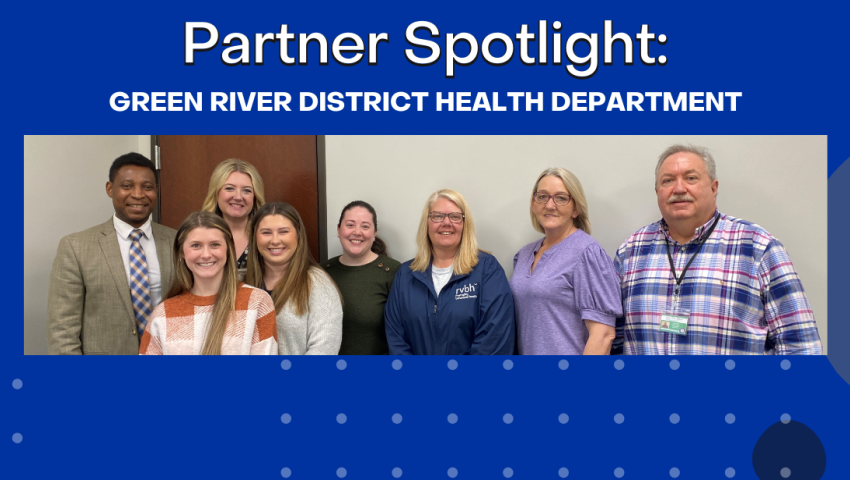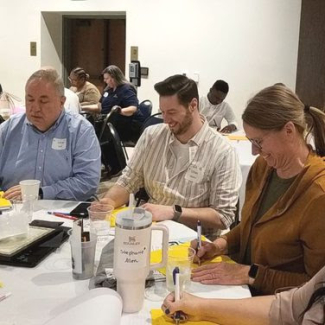
Partner Spotlight: Green River District Health Department
The Green River District Health Department (GRDHD) is located in Western Kentucky and serves seven counties – Daviess, Hancock, Henderson, McLean, Ohio, Union, and Webster. GRDHD’s mission is to “promote, protect and strengthen the health and well-being of all by helping develop and maintain healthy lifestyles and environmentally safe communities.” Since 1998, GRDHD has been working to educate the community about the dangers of tobacco use and secondhand smoke exposure through its tobacco prevention and education program. As part of their partnership with the Behavioral Health Wellness Environments for Living and Learning (BH WELL) research team, GRDHD supports behavioral health organizations working towards advancing tobacco-free policy and tobacco treatment services for people living with mental or behavioral health challenges who want to stop tobacco use.
People living with a mental or behavioral health challenge who use tobacco have a substantially reduced life expectancy and may die 10-25 years earlier than those who do not have a mental or behavioral health challenge and do not use tobacco. The most common causes of death among people living with mental and behavioral health challenges are heart disease, cancer, and lung disease, all of which can be caused by tobacco use. Provision of tobacco treatment services has a positive impact on both the mental and physical health outcomes of people living with mental and behavioral health challenges and can aid in recovery. Given such an impact, GRDHD works diligently in the community to integrate tobacco treatment services within local mental and behavioral health organizations.
Gary Hall, GRDHD Health Educator II, leads the tobacco prevention and education program at the health department. He assists behavioral health organizations working towards tobacco policy and tobacco treatment integration. Prior to his position with GRDHD, Hall spent 27 years with RiverValley Behavioral Health (RVBH), where he served in many roles including Director of RVBH’s Regional Prevention Center. In 2023, Hall received the David B. Stevens, MD, Smoke-free Advocate of the Year Award, one of the most prestigious honors awarded by the Kentucky Center for Smoke-free Policy. Hall’s expertise in behavioral health and tobacco prevention allowed GRDHD to support RVBH as they implemented a tobacco-free policy and integrated tobacco treatment system-wide in 2023. RVBH shares that, "Gary has been such a valuable resource to our team at RiverValley Behavioral Health while developing and implementing our smoke-free policy. His commitment to health and wellness is not only focused on our community mental health center but for the entire population in the Green River district. Gary served as a consistent collaborator to our team by sending us resources, data and relevant information related to NRT to guide our conversations, workplan and policy. He is a champion in the field and we are grateful to have him as a colleague".
This tremendous collaborative effort was recognized by BH WELL in the fall of 2023 when RVBH was presented with the 2023 BH WELL Tobacco Treatment Integration Award. BH WELL Director Dr. Zim Okoli celebrated their accomplishment and shared that, "Although the stigmatization of people living with mental and behavioral health challenges has normalized tobacco use in mental and behavioral health settings, community partners like Green River District Health Department and RiverValley Behavioral Health are working hard to support mental health and recovery by normalizing tobacco-free environments and access to tobacco treatment services.” Increasing accessibility and availability are two essential ways to break down disparities in tobacco use and the related health problems within the behavioral health community.
In addition to RVBH, GRDHD partners with many other community-based organizations as well as federal, state, and local government agencies. Hall believes one advantage of partnerships in the Green River District is the ease with which smaller community organizations collaborate. Each partner has a role to play in the successful implementation of tobacco-free policy and tobacco treatment service integration. There can be an impactful domino effect when one partner’s successes turn into another partner’s motivation toward these same goals.
Reflecting on his partnership with BH WELL, Hall shared, “Along with being patient, BH WELL reminded me about best practices. They provided research that we were not familiar with, especially regarding treatment success for individuals. In particular, they helped us understand comprehensive smoke-free policy, such as ensuring that it is campus-wide. BH WELL has acted as a guide for both RiverValley and the health department. I really believe if they hadn’t been a part of this, the progress wouldn’t look how it does today.”
Following best practices is what led RVBH to successfully implement its comprehensive smoke-free policy on August 1, 2023. For GRDHD, the most rewarding part of collaborating with RVBH on this effort was having the ability to impact change. Hall believes that this success would not have happened without federal and state tobacco control funding targeted toward the mental and behavioral health population. GRDHD receives funding from the Kentucky Tobacco Prevention and Cessation Program through a grant from the Centers for Disease Prevention and Control (CDC) specifically to support this type of work.

GRDHD Health Educators Gary Hall and Ethan Martin with Owensboro Health’s Holly Logsdon, RN, TTS, participating at the 2023 Kentucky Tobacco Control Conference.
GRDHD continues to promote tobacco treatment as a component of support for people working towards recovery from mental and behavioral health challenges. The team has many important projects on the horizon including a collaboration with an all-women's addiction recovery group where they plan to incorporate tobacco treatment services.
Collaborations such as this change lives. For example, Hall recalls BH WELL visiting RVBH with him to discuss going tobacco-free. In that meeting were several people who had been using tobacco but have now stopped. “This just shows the power of the conversation,” said Hall. To see this power in action, you can watch Mary’s story on stopping tobacco use here.